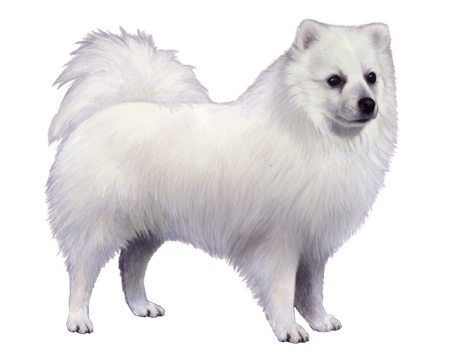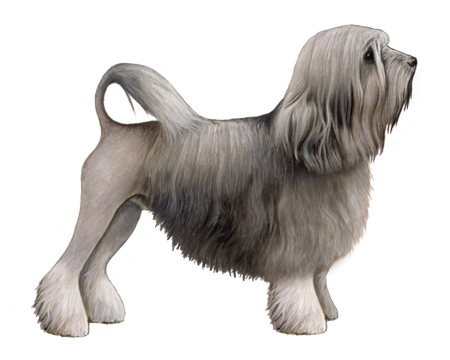
Swedish Vallhund
The Swedish Vallhund is as outgoing and alert as it is adorable. Over the course of the breed's long history, these bundles of energy transitioned from sociable herding dogs to smart, active family pets.
Interested in discovering if your dog is a Swedish Vallhund?
Check out Wisdom Panel's DNA tests.

Swedish Vallhund Traits
General Appearance
A small herding dog, the Swedish Vallhund has a muscular build, powerful gait, and intelligent, alert expression.
Coat and Coloring
This breed has a soft, dense undercoat and harsh topcoat with medium-length hair—which is close and tight but never woolly, curly, or fluffy. The Swedish Vallhund's hair is shorter on the head and foreparts of the legs and longer on the chest, neck, and back of the hind legs.
The breed standard requires a sable pattern with colors ranging from gray to red (or combinations of these colors in various shades). The most desirable coloration is lighter shades of gray through red on the chest, belly, buttocks, lower legs, feet, and hocks, and darker shades on the back, neck, and sides of the body.
The Swedish Vallhund should have a well-defined mask with lighter hair around the eyes, muzzle, and throat compared to the head. In shows, white is allowed as a narrow blaze, neck spot, or markings on the legs and chest. But it should not make up more than one-third of the body.
Distinctive Physical Traits
Being long and low to the ground, Swedish Vallhund can nip at the heels of cattle without getting kicked. These dogs have strong, muscular builds and wedge-shaped heads, short, square muzzles, dark brown, oval eyes with black rims, and medium-sized, pointed ears. Their tails may be long, stub, or bobbed. And the dogs can be shown natural or docked, according to breed standards.
Swedish Vallhund Temperament
The Swedish Vallhund is about what you'd expect from a herding breed: energetic, watchful, alert, fearless, and active. These characteristics make it well suited to the working dog life. But the breed's friendly, intelligent, eager-to-please nature is also a fantastic fit for active families.
Strong protective instincts make Swedish Vallhunds excellent guard dogs. But because of their herding heritage, they may dig, chase wildlife, or attempt to herd other pets and children. These dogs can be tenacious and may be difficult to disengage from an activity. The Swedish Vallhund is also a vocal breed, and its unique bark may be problematic in close quarters.


Swedish Vallhund History
You might mistake the Swedish Vallhund for a Corgi. Though the breeds appear similar and are likely related, they actually have distinct histories and traits. Experts think this so-called "Little Viking Dog" may have resulted from the crossbreeding of Welsh Corgis and Scandinavian spitz dogs during regular Viking raids of Britain between the 8th and 11th centuries.
But beyond that, the details of where and when the breed developed are hazy. More recent records suggest Swedish Vallhunds—also known as Vastgotaspets and Swedish Cattle Dogs—almost went extinct in the 1940s. Fortunately, Swedish Count Bjorn Rosen helped restore the breed's numbers.
Prized in Sweden as active, rugged cattle dogs and excellent all-around farmhands, Swedish Vallhunds eventually achieved worldwide popularity. They have now appeared on postage stamps in Sweden, Nicaragua, Ukraine, Mali, Russia, and Tajikistan.
Swedish Vallhund Care
Nutrition
Swedish Vallhunds need a high-quality dog food appropriate for their life stage (e.g., puppy, adult, senior). Also, consider a diet formulated for active breeds. Though the Swedish Vallhunds are highly energetic, they tend to become overweight. Prevent this by measuring out meals rather than free-feeding. And limit treats to no more than 10% of your dog's daily calories.
Grooming
Brushing the Swedish Vallhund at least once per week will help remove cast-off hair and reduce shedding. During the semi-annual shedding season—when this breed blows its coat—daily brushing and regular baths (followed by a little time under the hairdryer) can help.
Trimming nails, cleaning ears, and brushing teeth should also be part of every dog's grooming routine, regardless of breed.
Exercise
The Swedish Vallhund is an active, lively breed that requires a lot of exercise. These farm dogs benefit from daily walks, romps at the dog park, and other forms of physical activity. Canine sports—including agility, rally, or competitive obedience—are another way to give your pup a physical and mental workout.
Training
Intelligent and alert, Swedish Vallhunds are a joy to train and enjoy working alongside their people. When teaching new commands, prioritize positive reinforcement and rewards rather than harsh discipline. This capitalizes on the breed's eagerness to please and tends to work best. Also, clicker training is especially effective with the Swedish Vallhund.

Swedish Vallhund Genetic Health Conditions
-
Progressive Retinal Atrophy (Discovered in the Swedish Vallhund)
Progressive Retinal Atrophy (PRA) causes the light sensitive photoreceptor cells in the eye to degenerate, leading to night blindness.
Knowing if your Swedish Vallhund is a carrier or at-risk for these conditions can help you and your veterinarian plan for your pup’s lifelong care. With Wisdom Panel™ Premium, you can get results for over 200 genetic health tests.
Breed Group
Companion
This group consists of dogs typically bred for the specific purpose of human companionship, and many are popular pets because of their gentle nature. They became more common as the concept and luxury of dogs as pets prevailed.
Resources
https://www.akc.org/dog-breeds/swedish-vallhund/
http://images.akc.org/pdf/breeds/standards/SwedishVallhund.pdf
Reviewed July 26, 2020 by Cindy Elston, DVM, MPH



























_Color.png)





















